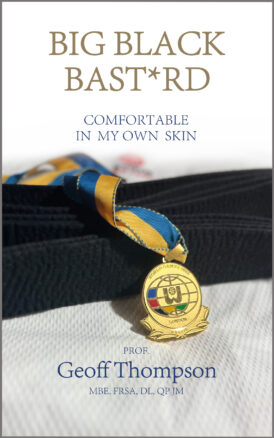
At the heart of the book is my identity as a child of the Windrush generation. My parents’ migration from the Caribbean to post-war Wolverhampton set the stage for the dislocation, hardship, and resilience that defined my early life. The premature death of my father left my widowed mother to raise me in an environment marked by racism, poverty, and the turbulence of inner-city East London. For me, revisiting these experiences is not simply autobiographical; it is a way of situating myself within the broader Black British narrative and showing how adversity forged my worldview. I carried “two chips” on my shoulders — my skin colour and my Wolverhampton accent — challenges that gave me an early awareness of the structural and cultural barriers Black people faced in Britain.
My journey through sport was another motivation. My discovery of karate offered not just self-protection against hostile environments of gang rivalry and racial violence, but also a curriculum for life, discipline, and empowerment. From my entrepreneurial beginnings selling patties to fund my training, to my rise as a World Champion, my sporting career epitomised a transition from the streets to the world stage. But sporting success was not an escape from racism — it was another arena in which it had to be confronted. My later work, campaigning for the role of sport for social change, serving seven Prime Ministers, and advising on youth development, emerged from this conviction.
Another powerful motivation lies in my political and social activism. The riots of the 1980s, the rise of the National Front, and my later involvement in international struggles from post-apartheid South Africa to Manchester’s ganglands placed me at the heart of civil rights battles. My memoir is intended as a corrective to sanitized or partial histories of these struggles. Having “walked the corridors of power,” I am uniquely positioned to expose how Black voices have been ignored or tokenised, and why systemic racism persists.
 The provocative title speaks to another motivation: reclamation. “Big Black Bast*rd” is not a term of endearment but a racist slur that I, like many others, have endured. By naming my book with these words, I transform insult into empowerment, forcing the reader to confront the rawness of Britain’s racial lexicon. The title is deliberately unsettling, designed to provoke reflection on the casual cruelty of language and its impact.
The provocative title speaks to another motivation: reclamation. “Big Black Bast*rd” is not a term of endearment but a racist slur that I, like many others, have endured. By naming my book with these words, I transform insult into empowerment, forcing the reader to confront the rawness of Britain’s racial lexicon. The title is deliberately unsettling, designed to provoke reflection on the casual cruelty of language and its impact.
Finally, Big Black Bastrd* is motivated by the urgency of the present. Written in the aftermath of Black Lives Matter and amid ongoing debates about Britain’s colonial legacy and institutional racism, I wanted to situate my story in dialogue with contemporary struggles. My account insists that the racism I experienced is not relic but reality, and that the fight for equality remains unfinished. My book is both a reflection and a rallying cry, an attempt to inspire readers regardless of race, background, or belief, to confront injustice and embrace resilience.
Big Black Bastrd* is also a spiritual journey of my relationship with God, reflected in my Mother’s core beliefs instilled in me and in the life steps that I have taken as a self-confessed “Mummy’s boy” — serving God, working hard, and treating people as you wish to be treated. This is a book that you can believe, belong, and identify with.
